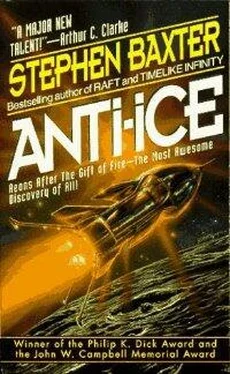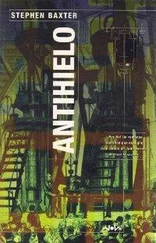“Which of us was?” I asked with feeling.
“In the end she suffered surprisingly little damage. A collapsing support leg, a bashed nozzle, a hatful of scars and scorch marks, an overstrained airpump or two—I might say, largely thanks to your own efforts there, sir.”
Now we left the conservatory and walked out into the fresh air, and so started to make our way to the front of the house once more.
“So she could fly again?” I asked.
“Could, but won’t, I think, sir. Sir Josiah has refuelled her, in order to test the workings of the motors, and has spent a deal of time on fixing her up, but I think he feels she’s done her bit. He has a headful of ideas for a second Phaeton, brighter and still more powerful than the first; I think he plans to turn the original into a sort of monument to herself.”
“And so he should,” I said.
Now Pocket drew to a halt and stared straight ahead. “Well,” he went on more quietly, “it’s only to be hoped that he’s allowed to put those ideas into practice.”
Puzzled by his tone, I turned to follow his gaze. Before the front door I saw the familiar figure of Traveller, his stovepipe hat screwed as incongruously and defiantly to his head as ever. He was, I saw, taking leave of his earlier visitor. The other man, now climbing into his brougham, was a wide- framed gentleman of about sixty, whose features were naggingly familiar; I studied the gray hair swept across his head, the rich white sidewhiskers, the rather lifeless eyes, the grim, downturned mouth set in a Moon of a face—
“Dear God,” I whispered to Pocket. “That’s Gladstone himself!”
The Prime Minister took his leave of Traveller; with a snick of the driver’s whip the brougham pulled away. Traveller walked slowly along the side of his home, absently studying the ivy which clung to the brickwork. I would have gone to him, but Pocket held my sleeve firmly, indicating no; and we waited for Sir Josiah to reach us in his own time.
At last he stood before us. He straightened his shoulders, fixed his hat more correctly at the center of his cranium, and held his hands behind his back; his platinum nose glinted in the weak November sunlight. “Well, Ned,” he said, his voice as pale as the Sun. “I heard you arrive. I apologize for my—preoccupation.”
I demanded without preamble: “That was the Prime Minister, wasn’t it?”
“You must drop this habit of restating the obvious, Ned,” he admonished; but his tone was abstracted.
“I have heard of the fall of Bazaine, at Metz.”
“Yes.” He looked at me carefully. “Such was in the journals. But there is also news of the Albert.”
Suddenly my head was filled with thoughts of Françoise; and I shouted, “What news? You must tell me.”
“Ned—” He took my arms. “The Albert has been converted into a vehicle of war. The French saboteurs, the…” He groped for the phrase.
“The franc-tireurs.”
“They have taken it over, installed cannon, and so have converted it into a gigantic mobile castle. And they are driving it toward Paris, where they plan to engage the besieging Prussians. Ned, it is quite insane. The Albert is a passenger ship, not a man-of-war. One accurate shell and it would be done for…”
The images conjured by his words were so fantastic that I found it almost impossible to grasp their thread of meaning. “And the passengers? What of them?”
“There is no word.”
I said, a little harshly, “And what is the import of all this? The Prime Minister of Great Britain does not call in person to deliver news, however dramatic, Sir Josiah.”
“No, of course not.” His eyes slid away from mine, and he adopted that strained, hunted look I had observed in the Lubbocks’ farmhouse. “The news about the Albert was Glad Eyes’ way into my sympathy. I believe he hoped to link, in my mind, the European war with my own endeavors.
“The government have reached their point of decision, you see. Metz has collapsed, yes; but Paris holds out, against all reason, even at the cost of starving its own citizens. Meanwhile the Prussians sound ever more bellicose and grandiose. There seems little prospect of a just settlement to this war; and the government rather regret that the Europeans no longer find it possible to conduct a war like good chaps, finishing according to the rules.” He shook his head. “Gladstone says Europe may collapse into terminal chaos for a generation, if Britain does not intervene. He says that, but of course he believes no such thing. Britain as usual is pursuing its own aims, and Gladstone would say anything to have me cooperate. And yet—and yet, what if there is truth in what he says? What right have I to resist the tide of history?” He clapped his hand to his forehead, shoving back his hat, and shook his head.
I took his arm. “Sir Josiah, has he asked you to bring back your anti-ice weapons of the Crimean campaign?”
“No. No, Ned; they want new weapons… They have such ideas as you would not believe. How can human beings, men like you and me, walk around with their heads full of such thoughts?… And they say that if I do not cooperate, they will withdraw their investment.” He laughed bitterly. “Which was precarious enough anyway. They will turf me out of my home, destroy my access to anti-ice; and a team of lesser men will be set to do their bidding in my place.”
I stared into his long, tortured face, and recalled Holden’s analysis of the man’s poor financial acumen. Was this to be the great engineer’s Achilles’ heel, the flaw that would bring his work at last to ruin—just as it had destroyed, in the end, the plans of his hero Brunel?
I hoped that Traveller would have none of the government’s obscene plan, but there was uncertainty in his face, and his next words discouraged me.
“Gladstone is a fool and a philanderer, no doubt; but he is also a politician, Ned; and he has planted doubts in my mind! For if I construct these devices, perhaps I can indeed make them, as he says, ‘scientific’ in their effectiveness. Whereas if lesser men begin to meddle with this we could face a disaster on a scale never before witnessed.” His face was quite open now and full of pain. “Tell me, Ned. What am I to do?… I fear I must cooperate with them, for fear of the alternative—”
“In God’s name, Traveller, what do they want you to build?”
He dropped his head as if in shame. “Rocket boats. Like smaller versions of the Phaeton. But these would not be driven by a human pilot; instead an adaptation of my navigation table, with its gyroscopic guidance system, could serve to guide the rocket to its landing point.”
I was mystified. “But what would be the purpose of these manless Phaetons? What would emerge after they landed?” I wondered vaguely if they would carry ammunition or food in to the beleaguered Parisians, but Traveller was shaking his head.
“No, Ned; you don’t see it yet. And I don’t blame you, for it takes an imagination of a particular devilishness.
“The rocket boat does not land. It is allowed to crash into the earth, in the manner of artillery shells. When it does so a Dewar of anti-ice shatters; the anti-ice spills out into the heat of the earth, and a monstrous explosion ensues.”
He spread his arms wide and turned about, as if drunk. “You have to admit there is a certain grandeur in the concept,” he said. “From my own garden, here, I would be able to launch a shell which would reach across the Channel, all the way to Paris, and fell the pride of Prussia with one hammer blow—”
“No!”
Traveller and Pocket stared at me.
A thousand emotions coursed through my poor heart. The conflicting images of Françoise warred in me: the sweet face which had become, during our perilous voyage around the Moon, a talisman to me, a symbol of hope and the future, of all to which I would return; but underlying it, as the skull underlies the fairest visage, was the specter of the franc-tireur, a totem of all those who would unleash war and death on the fragile bowl of Earth I had watched from above the air.
Читать дальше












